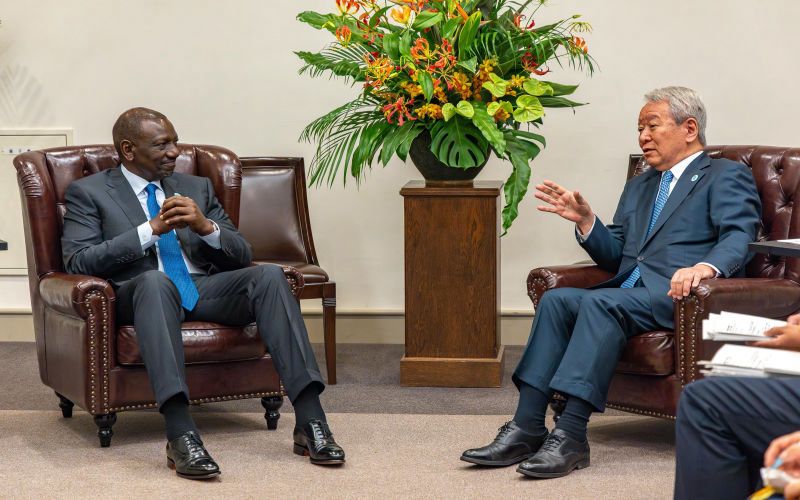Kenya secures Sh22 billion Japan loan to boost industry and cut power costs

Under the financing arrangement, the Ministry of Investment, Trade and Industry will receive Sh13.1 billion to support local vehicle assemblers parts manufacturers and expand electric vehicle production
Kenya has secured a 25 billion Yen (Sh22 billion) Samurai loan from Japan to accelerate industrial growth and lower electricity costs, a deal signed on the sidelines of the Ninth Tokyo International Conference on African Development (TICAD 9) in Yokohama.
The agreement was witnessed by President William Ruto and Japanese Prime Minister Shigeru Ishiba.
Prime Cabinet Secretary Musalia Mudavadi signed on behalf of Kenya, while Nippon Export and Investment Insurance (NEXI) Chairman and CEO Atsuo Kuroda signed for Japan.
“This unique Samurai financing facility will promote our transformative program to stimulate the entire automotive value chain, foster linkages with other sectors, and promote innovation, research and development,” Mudavadi said.
He added that the funding would also strengthen the energy sector by addressing transmission and distribution losses, which currently account for 23 per cent of Kenya’s national electricity output.
“It will further improve access to affordable, reliable power by reducing losses in electricity transmission and distribution,” he noted.
Under the financing arrangement, the Ministry of Investment, Trade and Industry will receive 15 billion Yen (Sh13.1 billion) to support local vehicle assemblers, parts manufacturers, and expand electric vehicle production.
The support is also expected to cut reliance on imported used cars and spares while creating opportunities for technical training to prepare youth for jobs in the green automotive sector.
The Ministry of Energy will access 5.5 billion Yen (Sh4.8 billion) to purchase and install high-efficiency transformers aimed at reducing system inefficiencies and cutting consumer bills.
The remaining 4.5 billion Yen (Sh3.9 billion) will support general government expenditure to ease fiscal pressure.
“This facility demonstrates our proactive approach to diversifying funding sources and reducing reliance on traditional borrowing channels,” Mudavadi said, adding that the partnership is aligned with Kenya’s Bottom-Up Economic Transformation Agenda (BETA).
He emphasised that the programme will help reposition the country as a hub for clean mobility and affordable energy in the region.
The Samurai facility has a seven-year repayment period, with the National Treasury set to enter into an agreement with NEXI to guarantee credit access for the ministries involved.
Speaking at the TICAD 9 plenary, President Ruto renewed his criticism of global financial systems, saying Africa continues to be penalised by unfair credit ratings that make borrowing costly and unsustainable.
“The current global credit rating system often overlooks Africa’s unique economic realities, unfairly penalising our countries during periods of global distress. This must change,” he said.
He further backed calls for the establishment of an Africa Credit Rating Agency to complement reforms in global financial structures, arguing that such changes are necessary to unlock affordable, predictable and sustainable financing.
Ruto also urged African leaders to scale up intra-continental trade. Citing UNCTAD figures, he noted that only 18 per cent of Africa’s exports are traded within the continent compared to over 60 per cent in Europe and Asia.
“By all credible estimates, under the African Continental Free Trade Area, intra-African trade could surge by up to 50 per cent by 2035. This would generate immense wealth, create millions of decent jobs, expand opportunities for SMEs, and open new markets for African goods and services,” he said.
The President highlighted agriculture as Africa’s most underutilised sector despite employing more than 60 per cent of the population and contributing nearly a quarter of GDP. “This is not a failure of potential, but of investment, infrastructure, and integration,” he said.
On the sidelines of the conference, Kenya also signed other cooperation deals.
These included a Letter of Intent and Concept Note with Japanese pharmaceutical firm Shionogi & Co. Ltd, in partnership with the Global Antibiotic Research and Development Foundation, to expand access to Cefiderocol, a key antibiotic for bacterial pneumonia.
Additionally, the Kenya Industrial Research and Development Institute entered into a cooperation agreement with Japan’s Ministry of Economy, Trade and Industry to support human resource development, skills growth and technology transfer in industrial innovation.
Japanese Prime Minister Shigeru Ishiba also announced plans for an Economic Region Initiative of Indian Ocean-Africa to boost trade links between Japan and the continent.
